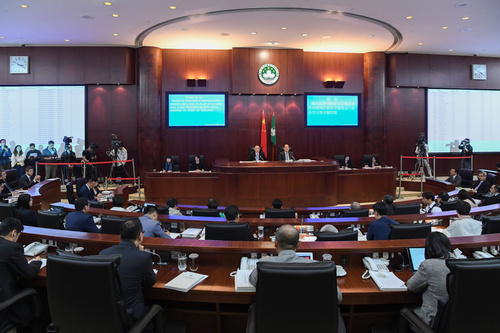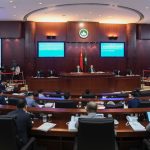 The Chief Executive, Mr Chui Sai On, attends a plenary meeting of the Legislative Assembly to answer enquiries raised by Assembly members concerning the Policy Address for the Fiscal Year 2018.
The Chief Executive, Mr Chui Sai On, attends a plenary meeting of the Legislative Assembly to answer enquiries raised by Assembly members concerning the Policy Address for the Fiscal Year 2018.
The Government would adhere to the principle of protecting the rights of the local workforce by controlling the size of the non-resident workforce, the Chief Executive, Mr Chui Sai On, told the Legislative Assembly this afternoon.
The Government would dedicate greater effort to perfecting the mechanism by which current non-resident workers exit the Macao labour market at the end of their contracts, and would provide more varied options for employment and training to Macao residents in order to enhance their career mobility.
When asked during this afternoon’s question-and-answer session on the Government’s Policy Address for 2018 about the management of non-resident workers, Mr Chui reiterated to the Legislative Assembly that non-resident workers were meant only to offset any shortfall in local manpower, a long-standing principle upheld by the Government.
The Chief Executive added that the Government would strictly assess applications for the importation of foreign workers based on prevailing economic conditions, and encourage large-scale enterprises to hire a greater number of local workers.
Regarding a mechanism to help promote the replacement of non-resident employees by local workers, the Government would thoroughly review the ratio of foreign to local workers upon the completion and inauguration of the second phase of Macao’s large-scale casino projects, in order to enhance the management of non-resident workers.
Meanwhile the Government would urge large firms to give priority for promotion to local workers, with the aim of allowing local employees in gaming operators to hold middle or senior management positions. The Government would help foreign workers in these middle or senior management positions exit the labour market and would gradually reduce the importation of, and the renewal of applications for, foreign workers holding such roles.
Mr Chui pointed out that the Government hoped to promote upward career mobility for Macao residents as outlined in the initiative for the strengthening of workforce training contained in Macao’s Five-Year Development Plan.
According to Mr Chui, the Government would ask gaming operators to state clearly the length of time the operator anticipated that a particular position would continue to be occupied by foreign employees. The operators would also be expected to provide training opportunities for local employees so that a greater number of local workers could become qualified to take up management positions.
The Government would strive to maintain the percentage of local employees holding middle or senior management positions in the six gaming operators at not fewer than 85 percent.
The Government would also facilitate the creation of a wide variety of jobs, promote career development, strengthen regional cooperation and encourage local residents to take exams leading to professional accreditation, in a bid to promote upward mobility.
With regard to industrial relations, Mr Chui said the Government would press ahead with the goal of building harmony between employers and employees and would continue to enhance the efficiency of mediation processes with regard to labour disputes.


